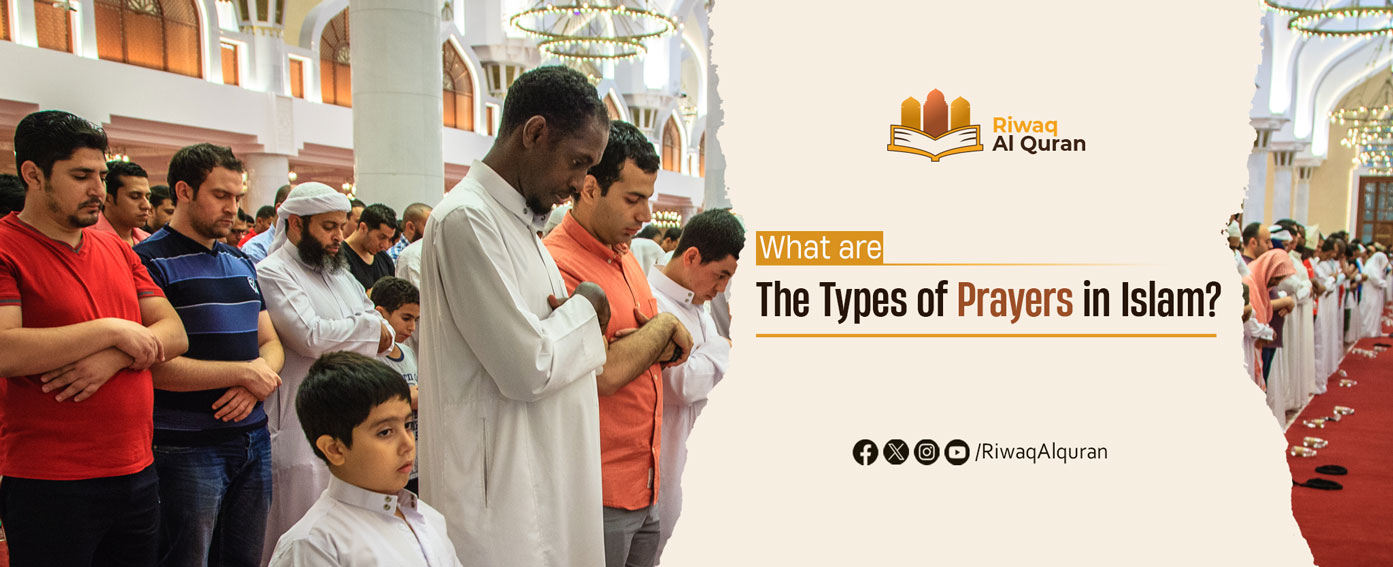In Islam, prayers are divided into three types: obligatory (Fard), including daily prayers and specific ones like Friday prayers; voluntary (Nafl), encouraged for spiritual growth; and special prayers for specific purposes such as seeking guidance or expressing gratitude.
Prayer is the connection between the Muslim and his Creator. That’s why every Muslim must pray five times a day. However, there are many types of prayer and different ways to categorize them.
Here is a brief explanation of the different categories and types of prayers in Islam.
Table of Contents
Three Prayer Catagories
Prayers in Islam can be categorized into three distinct groups based on different characteristics. Although there may be some overlap between these categories, understanding each of them is essential for comprehending the various types of prayers in Islam.
The first category pertains to the meaning of prayer, which can be further divided into two types: Dua and Salah. Dua refers to a general plea or request directed towards Allah, akin to the concept of prayer in English. On the other hand, Salah encompasses the specific forms, utterances, and acts of worship directed towards Allah, which is commonly referred to as prayer in Islam. All other variations of prayer fall under the umbrella of Salah.
The second category concerns congregational prayer, which involves the manner in which prayer is performed. Salah can be categorized into two types based on who performs it: Munfarid, which refers to praying alone, and Jama’ah, which involves praying in a group congregation. While some prayers are meant to be performed individually, others are better suited for group congregations. Understanding the distinction between these two types of prayer is crucial for practicing Islam effectively.
Lastly, the third category focuses on the type of Salah, which encompasses three distinct types of prayers in Islam: obligatory prayer (also known as Fard or Wajib), optional prayer (referred to as Sunnah or Nafl), and special prayer. Each type serves a unique purpose within the framework of Islamic worship, with obligatory prayers being mandatory, optional prayers being voluntary acts of devotion, and special prayers serving specific purposes or occasions.
What are the types of Prayer:
The types of prayers in Islam can be categorized into three main groups. Firstly, there are the obligatory prayers (Fard), which include the five daily prayers as well as other prayers like the Friday prayer and those during Umrah or for fulfilling vows (Nazr).
Secondly, there are voluntary prayers (Nafl), which are additional acts of worship beyond the obligatory ones and are highly encouraged for their spiritual benefits, such as strengthening one’s connection with Allah.
Finally, there are special prayers in Islam, each serving a unique purpose, such as seeking guidance through Istikharah prayer, asking for necessities in the Prayer of Need, praying for rain or during eclipses, performing funeral prayers (Janazah), or offering thanks through the Victory Prayer after significant blessings.
Lets discuss them in details:
1- Obligatory prayer (FARD)
The term “Fard Salah,” or obligatory prayer, pertains specifically to the Five daily prayers, constituting a fundamental pillar of Islam and a defining trait of genuine Muslim faith. Upholding these prayers is imperative for believers, symbolizing their commitment to the religion.
Apart from the daily prayers, other obligatory prayers include Salah Al-Jummah (Friday prayer), prayers during Umrah pilgrimage in Makkah, and Nazr prayer, wherein a Muslim commits to praying a specific amount in certain circumstances.
It’s essential to fulfill these obligations, as they hold significant spiritual significance within the Islamic tradition. However, certain prayers, such as the Eid prayer and Witr Prayer, provoke disagreement among different schools of thought regarding their obligatory status.
Read more on the Five daily prayers, timings, and how to perform them. Or if you prefer direct lessons sign up here: Online Course on the Five Pillars of Islam
2- Voluntary prayer (NAFL)
A Muslim may voluntarily pray before and after the five daily prayers. These are called (Nafl prayers) or (sunnah).
Nafl prayer helps complete the shortcomings of the main prayers. They also help get the Muslims closer to Allah by doing more and more.
Allah (Glorified is He) says: “And my slave keeps seeking to get closer to me by Nawafel (voluntary acts) until I love him.”
The important part about voluntary prayers is consistency. The most beloved deeds to Allah are the most consistent even if small.
Read more on optional prayers in Islam.
3- Special prayers in Islam
Special prayers are prayers with a special way or timing to perform. Here are some of the Special prayers in Islam, how to perform them, and why.
Istikharah prayer (Choice Making Prayer)
Istikharah means to consult, and in this context, it means to consult Allah and ask His aid with a matter or decision.
After praying two Rakat outside of the obligatory prayers you raise your hands to Allah and say the Dua of Istikharah, naming the matter you want guidance in
Dua Al-Istikharah: (O Allah, I ask your council by your knowledge, and your aid by your power, as you know and I don’t know, and you have power and I have no power and you are the knower of what’s hidden.
O Allah, if you know that (Name your matter) is better for me in my Deen, worldly life, and my hereafter, then write it for me, make it easy for me, and bless it for me
O Allah, if you know that (Name your matter) if worse for me in my Deen, worldly life and my hereafter, then turn it away from me and turn me away from it, and write for me the best wherever it is, and make me content with it.)
Note that Istikharah simply means that you seek the help of Allah, you still go through your worldly affairs normally, and if things are meant to happen, they will happen if not they will not.
Istikharah is a great tool in the arsenal of the believer to navigate life.
The Prayer of Need
This is similar to Istikharah but in a more general sense.
You also pray two rakat other than the obligatory prayers and then ask Allah what you (Need). Unlike Istikaharah this isn’t about a decision or a crossroad, but rather you are humbly asking for something you need from your lord.
Scholars differ in the validity of the prayer of need. Although it’s mentioned in Hadith, that hadith is weak. So, some scholars say it shouldn’t be followed, while others rely on the rule that weak hadith can be used in “Fada’il Al-Aamal” (Good deeds).
Rain prayer
A prayer of need that’s often prayed in Jama’ah (Congregation) is the Rain prayer, asking Allah for rain and water.
This is often instructed by the Imam if there is a dire need for it.
Eclipse prayer
When a solar or lunar Eclipse happens, it’s sunnah to pray and glorify God almighty and His power over the universe.
Allah says: “Don’t prostrate to the sun or the moon, but prostrate to Allah who created them if you truly worship Him.” Suratu Fusilat
Jananzah prayer
Janazah means funeral. Janazah prayer is a special prayer for a Muslim when He passes away. It’s mainly to ask Allah to forgive the deceased sins and make it easy for him in the grave and what’s after it.
Read more on Jananzah prayer (Insert Article link)
The Victory Prayer
This is a special prayer, done by Muslims when Allah blesses them with the opening of a new city.
It’s narrated by Um Hani’ that on the day when Makkah was opened, she saw the prophet peace be upon him pray in her house 8 Rakat. And it’s narrated that other companions did the same as well.
This is a type of Thanks for the great blessing of Allah.
Learn Quran, Arabic And Islamic Studies Online With The Best Native Tutors
Riwaq Al Quran is a comprehensive online platform that offers personalized Quran, Arabic and Islamic Studies Online classes for individuals of all ages and backgrounds.
Their experienced instructors use a structured curriculum to cover Tajweed, Tafsir, and Memorization, providing easy and effective access to learning the Quran.
The advanced online classes allow for seamless communication and interaction between students and teachers. Join Riwaq Al Quran for a deeper connection with the Quran.
We offer several courses such as:
- Online courses for kids.
- Online Quran classes for kids and adults.
- Online Arabic courses
- Online Ijazah courses
- Online Islamic Studies courses.
Here are a sample of our set of Quran Courses that will be helpful for you:
- Online Tafseer Course: Delve into Quranic meanings with our insightful online Tafseer course.
- Noorani Qaida Online: Learn Quranic basics efficiently through our Noorani Qaida online program.
- Online Quran Recitation Course: Enhance Quranic recitation skills through our expert-led online course.
- Online Tajweed Classes: Master Tajweed rules for beautiful Quranic recitation in online classes.
- Quran Memorization Online Course: Memorize the Quran effectively with our specialized online memorization course.
- Online Qirat Course: Explore diverse Qirat styles with our comprehensive online Qirat course.
Online Quran Classes for Kids: Nurture a love for the Quran in kids through interactive online classes.


Conclusion:
In Islam, prayers fall into three categories: obligatory (Fard), which encompass the daily prayers and other mandated ones like Friday prayers and those during Umrah or vows; voluntary (Nafl), which are additional acts encouraged for spiritual growth; and special prayers, each serving distinct purposes such as seeking guidance, asking for necessities, praying for rain or during eclipses, offering funeral prayers, or expressing gratitude for blessings.
Now that you know the different types of prayers, start by taking the first step and put what you know into action.



































